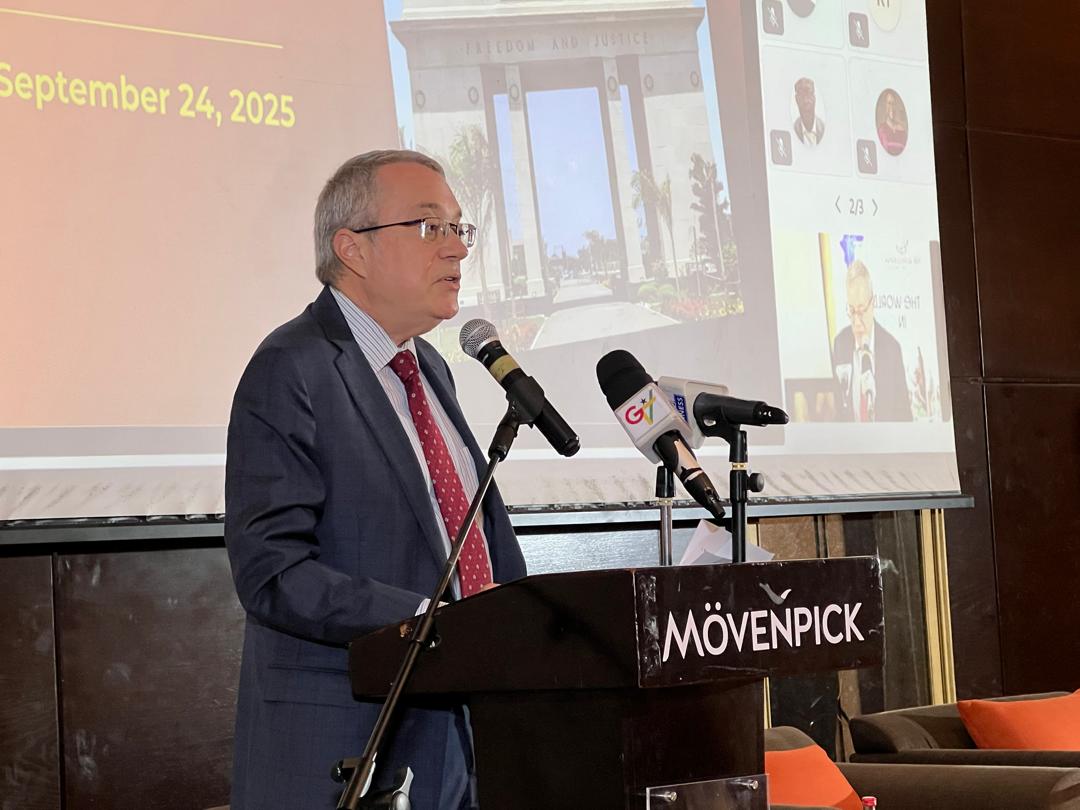
Accra, Ghana// – The World Bank Group’s Policy Notes, “Transforming Ghana in a Generation”, revealed that Ghana can achieve a generational transformation by implementing comprehensive policies and institutional reforms to boost productivity, improve infrastructure services, and strengthen human capital and its workforce skills.
These reforms, according to the report, which was launched in Accra today, could sustain economic growth exceeding 6.5 per cent, triple per capita income by 2050, and counter headwinds from demographic trends and the decline in natural resources.
In his welcome address, Robert Taliercio, World Bank Division Director for Ghana, Liberia and Sierra Leone, noted that Ghana has made significant strides in the past. In the early 2000s, Ghana recorded robust economic growth that averaged 6.8% annually between 2009 and 2019.
The country also achieved a dramatic poverty reduction, halving the rate from 1991 to 2016 to reach 23.4%. This progress not only outpaced much of Sub-Saharan Africa but also enabled Ghana to meet its Sustainable Development Goal on poverty reduction, he added.
“However, in the past decade, Ghana’s economic and social prospects declined due to rising macroeconomic challenges, culminating in a severe crisis in 2022 that undermined poverty reduction and job creation efforts. For example, between 2012 and 2023, only 250,000 net jobs were created, most of which were in low-productivity sectors.
Moreover, Ghana’s history is marked by repeated cycles of fiscal expansion followed by sharp adjustments, reflecting recurring fiscal stress and a challenging political economy that have made sustained reforms difficult”.
Mr Taliercio observed that sustaining policy reforms remains challenging and risks would continue to escalate unless prompt, decisive actions are taken.
He, for instance, cautioned:
- Further delays in the long-awaited reforms of the energy sector are risking the country’s macro-financial sustainability. It cost the government approximately US$1.4 billion in 2024 on transfers to cover the financial shortfalls in the energy sector, and these are projected to rise to about US$2 billion by 2026.
This is about 2 per cent of GDP, which could otherwise be used for priority spending in health, education or improving Ghana’s road network. In this sense, every month of delay is extremely costly for the nation.
We are deeply concerned about insufficient progress on these critical reforms. However, some advancements are evident in the sector, as shown by the 40 per cent increase in revenues recorded through the cash waterfall mechanism this year – pending audit confirmation – compared to the same period last year.
- Similarly, reforms in the cocoa sector are urgent to improve the sector’s resilience and financial sustainability. COCOBOD’s current operational framework creates significant inefficiencies and market distortions that result in debt accumulation and increase fiscal liabilities.
- On the social front, improving the coverage and targeting of the Livelihood Empowerment Against Poverty program (LEAP) and the efficiency and effectiveness of health spending, particularly of NHIS, are key elements to the country’s social contract.
Carefully managing the financing mix to match the return on investment with financial costs ensures resources meet public needs. Using affordable and highly concessional external financing like IDA to finance capital investments supports development and costs less than domestic borrowing:
- Short-term domestic financing (T-bills) cost an average of 27.4% interest in 2023-2024, while IDA regular and blend financing terms were between 0.75% and 2.0% (including service fees and interest), with favourable grace periods.
- Even with recent declines in average domestic borrowing costs to 11.9% in September 2025, new IDA blend terms offer significantly lower rates at 1.5%, locked in for longer periods.
So, it’s an obvious choice in terms of using all IDA available before resorting to further domestic financing, he stated.
“Ghana has a unique opportunity to restore fiscal discipline, improve governance, and leverage natural and human capital resources for broad-based and inclusive development to transform the country within a generation”, Mr Taliercio told participants at the well-attended launch.
“To sustain high growth, it must join other countries that have maintained prolonged periods of robust economic growth and successfully avoided the middle-income trap by maintaining macroeconomic stability, low inflation rates, and sustainable public finances.”
Presenting an overview of the report, Stefano Curto, Lead Economist for Ghana, Liberia and Sierra Leone and Lead Author said: “The choices Ghana makes now can unlock a generation of inclusive, resilient growth, and deliver on the promise of sufficient quality jobs for its citizens. The World Bank Group stands ready to support Ghana’s leadership and the efforts of all stakeholders to make that promise real”.
The report also underscored an urgent need for reform: Ghana must break from past governance failures marked by fiscal indiscipline, inefficiency, and repeated IMF programs. The government must restore credibility through fiscal consolidation, transparency, and institutional reforms, and put debt on a sustainable path and avoid premature reentry to the Eurobond market.
The Policy Notes outline four critical foundations for driving Ghana’s transformation within a generation. First, restoring macro-financial stability demands better revenue collection, expenditure management, and reforms in key sectors like energy and cocoa to reduce fiscal risks.
Second, boosting productivity and jobs requires a business environment that attracts investment in high-productivity sectors, while improving education, health, and social protection to build human capital.
Third, sustainable management of natural resources and resilience in agriculture and infrastructure are essential for broad-based, inclusive growth. Lastly, reinforcing governance through stronger institutions, anticorruption efforts, and public sector reforms is vital to restoring trust and supporting effective development.


